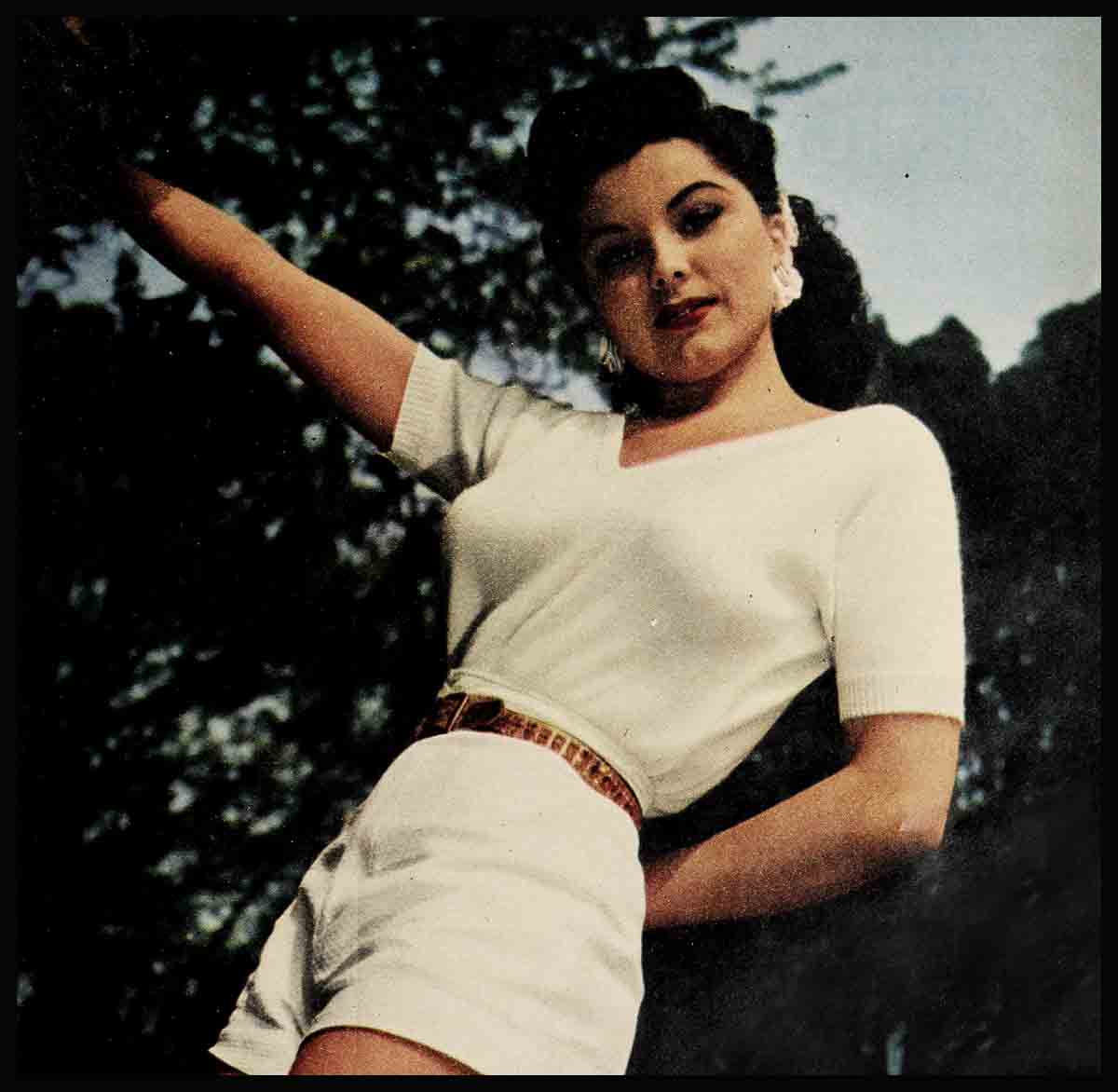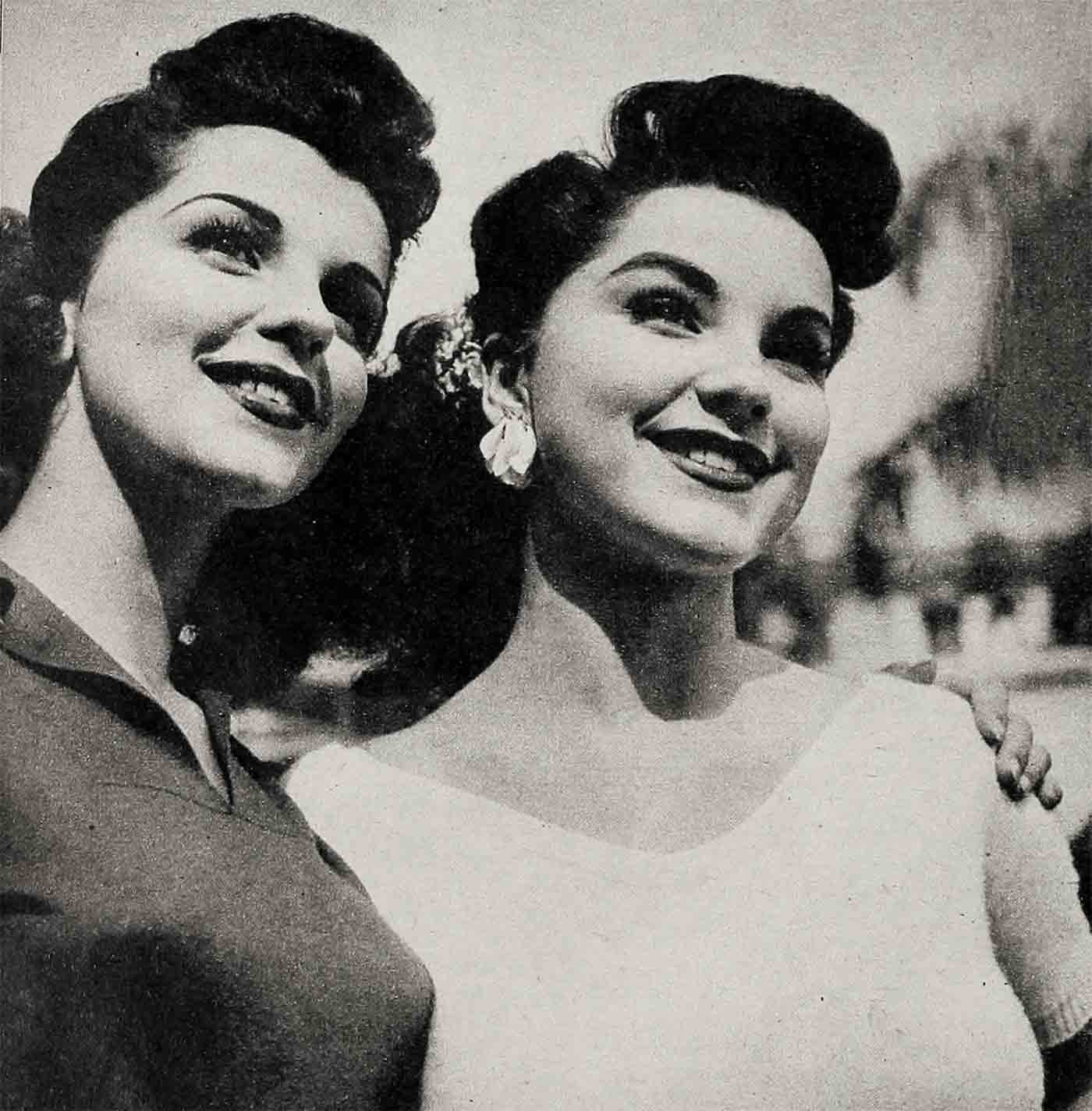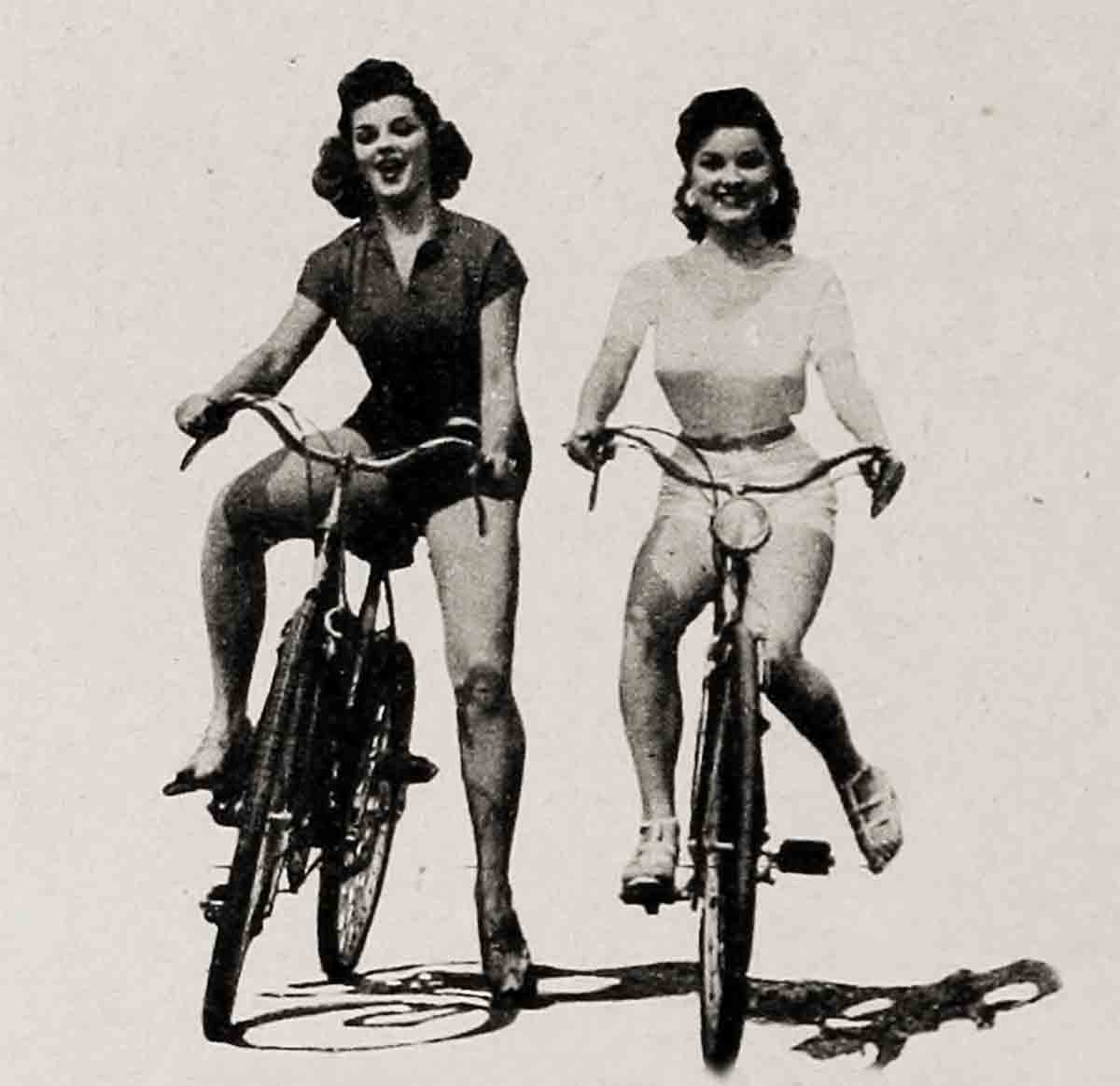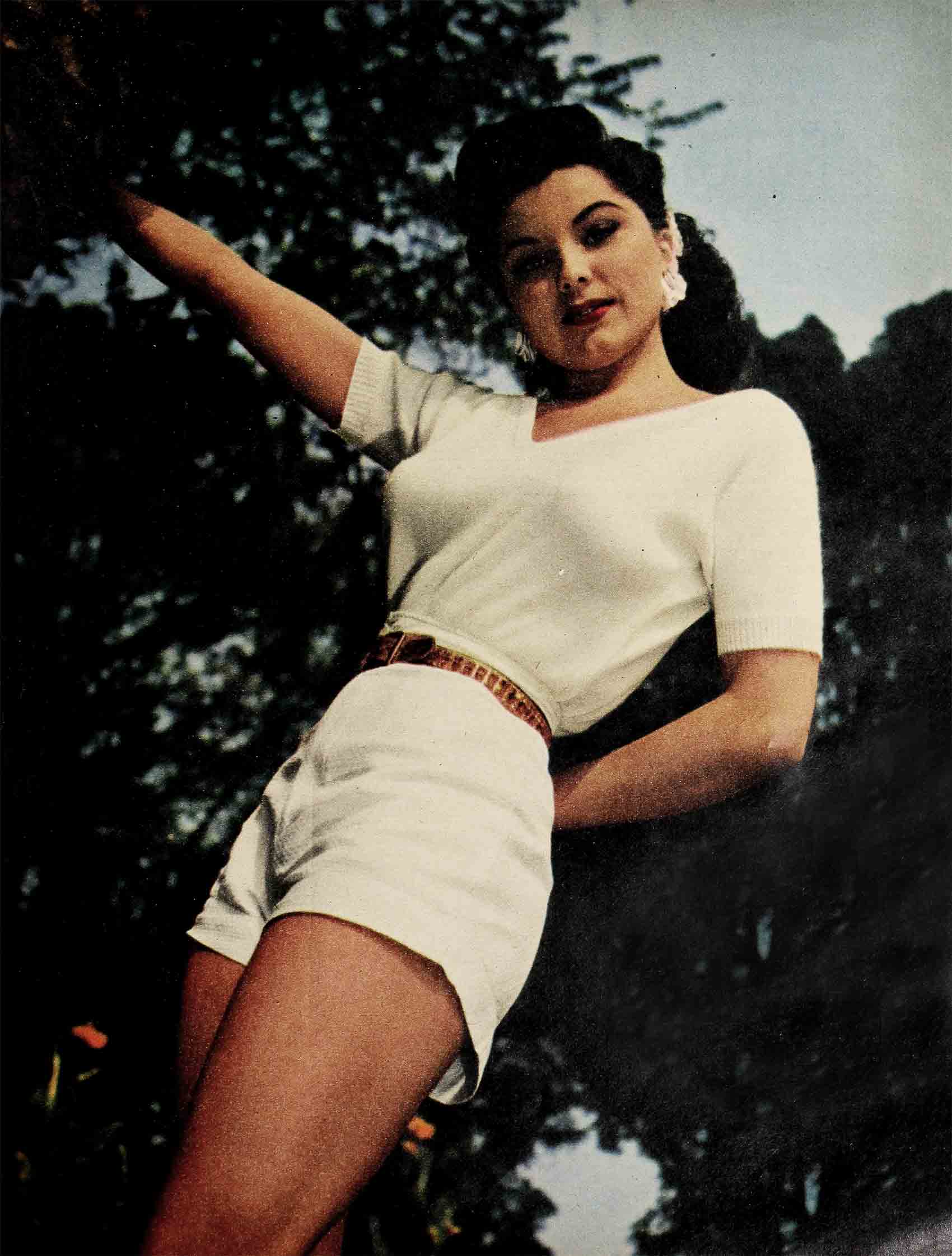
The Queen And I—Debra Paget & Lisa Gaye
If my sister, whose name is Debra Paget, ever plays the part of a twin in a movie the role won’t be too unfamiliar to her. Once she was a near-twin. I, born eighteen months after her, was the other. That was the closest our mother ever came to getting the twins she had always wanted. She made the best of it. She dressed us alike and as soon as my size caught up a bit with Debbie’s we actually began to get the kind of stares twins get. There was a resemblance, of course. The report on my first movie test (the first of nearly a dozen!) was unfavorable because I looked too much like Debbie to be accepted as a personality in my own right.
I can still remember that Debbie and and I liked being twins. There was a special allure to it because we had our big secret (that we weren’t twins really) and any time we wanted to be individuals again we could. That time came permanently for Debbie when she was nine years old. She fell in love with a pink and white dress which could not—be duplicated for me and that was the end of our “twin” period.
Almost everyone asks me, sooner or later, what Debbie is like to live with. I guess what they have in mind is the question one girl put to me bluntly. “Is she like a queen or something?” she wanted to know.
Well, if by “queen” she meant someone who floats around in an aura of unapproachable regality, the answer is no. It’s nothing like that. In fact, the queen is no queen. She is more accurately described as one of four sisters or as a girl who is interested in two things—her family and her work. She is quiet. She not only does her chores regularly (cleans her room, dressing room and livingroom and cooks dinner if she is the first one home) but she loves to do them and does them well. (Maybe I ought to list my chores: the two upstairs baths, the playroom, my father’s room and also the cooking if I get home first.)
She doesn’t parade her likes and dislikes, nor her ability. She talks less about boys than I do, but it is pretty well agreed around our house that she knows a lot more about them. She is more analytical about men than I am. She can tell the true from the false more readily.
I can remember having dozens of crushes when I was in high school—some so devastating that I would go running to my mother convinced that “this is it!” Debbie had few, if any. Today I can’t remember what half of my mad crushes looked like, and I can’t imagine what I saw in those I do remember. All this waste motion (and emotion) was something Debbie didn’t have to go through. She already knew puppy love for what it was (it was “for the birds,” she said) and saved her energy for more important things.

She thinks a girl, particularly one whose career places her before the public, should always be self-possessed. I don’t know how she does it, but Debbie keeps her head even when she has lost her temper. What I know about handling a flirt I think I’ve learned from observing her. She likes good-humored kidding, but she hates the hand patters. (“Hand pattery is a disease,” she says.)
Some of our friends think Debbie is a little too serious in her relationship with people; not easy to meet and certainly not easy to get to know. The answer to that is simple—Debbie, whom I can recall as a regular tomboy in her childhood, has had sobering responsibilities for a girl of her age—both as an actress and as an elder daughter in her family. The work she has had to do and the decisions she has had to make were at the expense of her playtime girlhood years. She has always known that her career is not only important to her but can mean (and has meant, for that matter) a lot to all of us. I’m in pictures simply because Debbie got me into them. She encouraged me, she helped me study, and she practically placed me in my studio.
Actually, Debbie has gone to a great deal of trouble to keep from growing away from people. I can remember when she decided to give up going to school in the studio, even though it was so convenient, because she thought she would develop more normally if she went to a regular high school. Even today few of her friends even know she ever made such an attempt. She applied at Beverly Hills High, was admitted, and attended classes there for exactly three days! The girls there just wouldn’t accept her!
We realized later they couldn’t understand why a girl who could spend all her time at a movie studio would want to waste any of it in a school. They were actually suspicious of Debbie, as if they felt there must be something wrong with her! And Debbie, who just wanted friends of her own age and the kind of life that went with them, was broken-hearted when she had to give up the idea.
I am pretty sure that our twinship, even thought it didn’t last, set a pattern of close relationship that is with us even today. We do a lot of our dreaming and planning together, and certainly our working and playing.
Many nights we talk acting; we concoct wonderful roles and then the stories to go along with them. No writer has ever worked according to the formula we follow! We start creating for ourselves the kind of role we feel we can best portray; then we fit in the plot any old somehow! The way we figure, Shakespeare was wrong when he said “The play’s the thing!” (You know I’m just kidding.)
We do a lot of ballet practice and vocalizing together; that takes some of the monotony and hardship out of it. And if you want to go bicycle riding and the hearest place is a city street you know how silly you can feel by yourself, whereas it becomes fun when there is another girl along.

As we grew older Debbie and I learned that we were different in a number of ways—including one that really hurts me. I shall refer to it as our rates of metabolism. Debbie, who has a wonderful shape, can eat what she likes when she likes without gaining an ounce. The food gets burned up and disappears without burdening her down in any way. What I eat, however, just wants to stay with me forever. Consequently I must diet while Debbie doesn’t.
If only my appetite were small! But it isn’t. It’s titanic. I have to work at dieting. Only once a month do I indulge My craving for sweets. The family generally goes along and we head for a place famous for its hot fudge sundaes. A half hour after everybody else has finished I am still nursing my sundae along, trying to make it last.
We differ in our philosophies, too. Debbie has her sights always set on the future, mine are usually extended no further than maybe a half day beyond the present (in other words not past the next meal)! While I cotton to people more quickly than Debbie does, she is the one who likes to have visitors at our home on Sundays when we are not working. (I just want the family around.) Quiet as Debbie is, and ready to do anything to avoid a commotion, she occasionally sets off a riot around the getting an impulse to play a practical joke. The biggest scare I ever had in my life I got from Debbie one night when I was watching television and thought I was all alone.
The program was a suspense play and I was already enjoying goose pimples when Debbie sneaked into the house. She went to her room and pulled a silk stocking over her face so that her features were fearsomely distorted. She covered her hands with white cream. Creeping up behind me, she lifted the hands in front of my eyes as if she were about to choke me. I screamed and looked around to see a horrible brown smear of a face and my heart nearly exploded. If ever I was sore at Debbie and if ever we had a real fight, it was that night!
Ordinarily, we get along beautifully. Once in a while something comes between us—something, say, like the two peasant-style slips bought for us by mother. One was black and the other white. We both wanted the black one. We talked about it at night without settling the matter, and when I got up first in the morning it seemed only sensible to put on the black one. Why argue further?
Of course, just as I was leaving the house somebody had to think about it and somebody had to call her mother to call me back, and then we had to go into it all over again, the talk running something like this:

MOTHER: Lisa, which slip did you put on?
ME: Who, me?
DEBBIE: She put the black one on and I’ll need it today because I’m wearing my Moulin Rouge gown. (This gown was created for Debbie by Nikki, of Hollywood, and is a semi-cocktail and evening gown.)
ME: I’m wearing my strapless gold and the white slip won’t do for that. Goodbye.
DEBBIE: Mother! She’s going!
MOTHER: Lisa!
ME: Who, me?
MOTHER: Take it off.
ME: Who, me?
MOTHER: Take it off, take it off, take it off!
And so I sniffed at everybody and said something about some people who are so inconsiderate just over a little old slip. And I took it off and I was sore. But when I got back from the studio that night I’d forgotten all about it. And the same with Debbie. I mean in cases where she has lost the argument, and sometimes she does, she harbors resentment no longer than I do.
Of course Debbie can get really angry if sufficiently provoked. Then she is something to handle! Nobody who knows her quiet ways today would ever believe that as a youngster she was a tree climber, a dare taker and a yelling leader of the neighborhood gang. For that matter, no one who knows my reputation as an extrovert (by comparison to Debbie, anyway) would believe that I spent most of my spare time in school writing poetry.
I wish I could let you read a sample so you would know I’m not kidding and because none of my stuff was ever printed!
Debbie gets some ideas out of my poems, she says. Also some laughs. I love to hear her laugh. When Jimmy Stewart and Debbie played in Broken Arrow, a Technicolor picture, she had to wear contact lenses over her blue-green eyes to make them look brown because she played a brown-eyed Indian maiden. In a scene that ended with a clinch, Jimmy was supposed to whisper, “I love you.” He did. Then he added, “but your right eye is slipping.” Debbie howled so loudly that cites claimed she disgraced her whole tribe.
Debbie had less trouble getting started in pictures than I did. She made it on her second test, but not until ten terrible days of waiting had passed. I’ll never forget the night we got the news. We were having a spaghetti dinner and were half way through when the telephone rang and someone asked for Debbie. She went to the telephone, talked quietly for a few moments, and then returned to the table to announce, still quietly, that Billy Gordon of 20th Century-Fox said she had been accepted because the studio had nobody like her.
Two years later I took my first test at 20th and was turned down because the studio already had someone of my type—Debbie, of course. From that day nearly five years ago, until last year, I was tested periodically by every studio in town. The answer was always no. Then one day my present studio, Universal-International, wanted to borrow Debbie from 20th for a picture. She couldn’t accept but she suggested that they test me for it. They did and signed me, but not for the role they were going to give Debbie. I didn’t care. I was started. Since then I have had small roles in a half dozen pictures but, in my last film Drums Across The River, I play opposite the star, Audie Murphy. Next on the list for me is Francis Joins the WACS with Donald O’Connor. From now on nothing can stop me except, maybe, hot fudge sundaes. (And how I wish I had one!)
It is still much easier for me to meet people and talk to them than for Debbie, but why shouldn’t it be? People don’t get that odd “Oh!-she’s-a-celebrity” look in their eyes when they see me. They don’t recognize me at all most of the time. When I do seem familiar to them it’s because they think I’m Debbie.
But anyway, Debbie is no queen, and I shall never be a queen either—mainly because of the lady who is our mother. Margaret Griffin (Mother’s stage name) knows what life is about and has given us the benefit of her knowledge. One of her big lessons is that pretense belongs strictly on the stage—not off it. She can spot false temperament, or even just plain temper, while it is still aborning. That is why Debbie is no queen in our domicile and that’s why I’m not even a princess! We’re just two of mother’s four daughters—the middle two. Let us know if you want to come to see us. We’ll ask Mother if it’s okay.
THE END
—BY LISA GAYE
Debra Paget can now be seen in 20th Century-Fox’s Prince Valiant.
It is a quote. MODERN SCREEN MAGAZINE MARCH 1954





No Comments